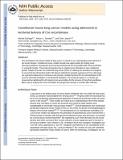Conditional mouse lung cancer models using adenoviral or lentiviral delivery of Cre recombinase
Author(s)
DuPage, Michel J.; Brauneis, Alison L.; Jacks, Tyler E.
DownloadJacks_Conditional mouse.pdf (2.554Mb)
OPEN_ACCESS_POLICY
Open Access Policy
Creative Commons Attribution-Noncommercial-Share Alike
Terms of use
Metadata
Show full item recordAbstract
The development of animal models of lung cancer is critical to our understanding and treatment of the human disease. Conditional mouse models provide new opportunities for testing novel chemopreventatives, therapeutics and screening methods that are not possible with cultured cell lines or xenograft models. This protocol describes how to initiate tumors in two conditional genetic models of human non-small cell lung cancer (NSCLC) using the activation of oncogenic K-ras alone or in combination with the loss of function of p53. We discuss methods for sporadic expression of Cre in the lungs through engineered adenovirus or lentivirus, and provide a detailed protocol for the administration of the virus by intranasal inhalation or intratracheal intubation. The protocol requires 1–5 min per mouse with an additional 30–45 min to set-up and allow for the recovery of mice from anesthesia. Mice may be analyzed for tumor formation and progression starting 2–3 weeks after infection.
Date issued
2009-06Department
Koch Institute for Integrative Cancer Research at MITJournal
Nature Protocols
Publisher
Nature Publishing Group
Citation
DuPage, Michel, Alison L Dooley, and Tyler Jacks. “Conditional mouse lung cancer models using adenoviral or lentiviral delivery of Cre recombinase.” Nature Protocols 4, no. 8 (June 25, 2009): 1064-1072.
Version: Author's final manuscript
ISSN
1754-2189
1750-2799